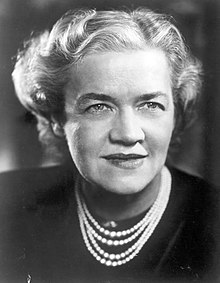Margaret Chase Smith
| Margaret Chase Smith | |
|---|---|
 |
|
| Chair of the Senate Republican Conference | |
|
In office January 3, 1967 – January 3, 1973 |
|
| Leader |
Everett Dirksen Hugh Scott |
| Preceded by | Leverett Saltonstall |
| Succeeded by | Norris Cotton |
|
United States Senator from Maine |
|
|
In office January 3, 1949 – January 3, 1973 |
|
| Preceded by | Wallace White |
| Succeeded by | William Hathaway |
| Member of the U.S. House of Representatives from Maine's 2nd district |
|
|
In office June 3, 1940 – January 3, 1949 |
|
| Preceded by | Clyde Smith |
| Succeeded by | Charles Nelson |
| Personal details | |
| Born |
Margaret Madeline Chase December 14, 1897 Skowhegan, Maine |
| Died | May 29, 1995 (aged 97) Skowhegan, Maine |
| Political party | Republican |
| Spouse(s) | Clyde Smith |
| Signature | |
Margaret Madeline Chase Smith (December 14, 1897 – May 29, 1995) was an United States politician. A member of the Republican Party, she served as a U.S Representative (1940–49) and a U.S. Senator (1949–73) from Maine. She was the first woman to serve in both houses of the United States Congress, and the first woman to represent Maine in either. A moderate Republican, she was among the first to criticize the tactics of McCarthyism in her 1950 speech, "Declaration of Conscience".
Smith was an unsuccessful candidate for the Republican nomination in the 1964 presidential election, but was the first woman to be placed in nomination for the presidency at a major party's convention. Upon leaving office, she was the longest-serving female Senator in history, a distinction that was not surpassed until January 5, 2011, when Senator Barbara Mikulski was sworn in for a fifth term. To date, Smith is ranked as the longest-serving Republican woman in the Senate.
Margaret Chase was born in Skowhegan in western Maine, to George Emery and Carrie Matilda (née Murray) Chase. She was the oldest of six children, two of whom did not survive to adulthood. Her father was of English ancestry, a descendant of immigrants to the United States in the 17th century; her great-great grandfather commanded an artillery company during the War of 1812, and her grandfather served in the Union Army during the Civil War. Her mother's family was French Canadian, having immigrated from Quebec in the middle of the 19th century; her grandfather, Lambert Morin, changed his name to John Murray to avoid anti-French Canadian and anti-Catholic prejudice. Her father was the town barber, and her mother worked as a waitress, store clerk, and shoe factory worker.
...
Wikipedia
